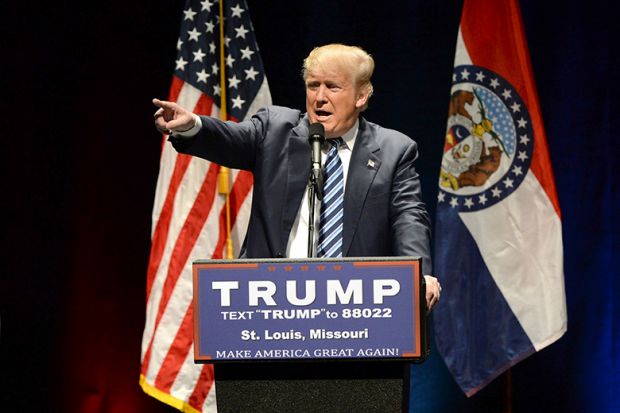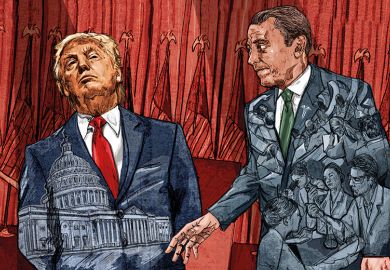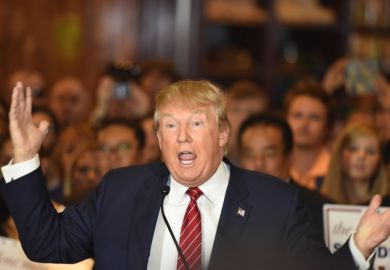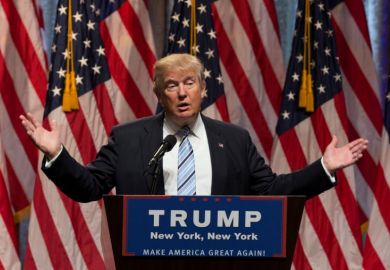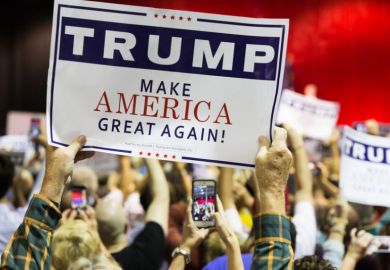Donald Trump’s highly unexpected victory is truly a sea change for US politics and society. Its roots, similar to the underlying causes for the Brexit victory in the UK, lie in a nativist reaction to globalisation and the changes imposed by the 21st-century economy.
While Trump has been unclear about his policies for higher education, his general orientation is clear enough. It includes building walls (literal or figurative) to keep out immigrants; banning Muslims from entering the country, or at least subjecting them to “extreme vetting”; tearing up trade agreements and other elements of a globalised economy; and, in general, presenting the US as an unwelcoming environment. So we can speculate about the likely consequences for the US’ global competitiveness in higher education.
The public research universities, already battered by more than a decade of state budget cuts, will be affected first and most seriously. But the top universities can weather a period of instability. This is especially true of the private universities, buttressed by their endowments and reliant on the government only for expenditures on research. Here, however, future prospects are dim, not only because of Trump’s potentially hostile attitude towards at least some areas of research (such as climate change) but also because of other pressures on the federal budget resulting from his promised tax cuts. The position of US higher education in global league tables could ultimately slip.
Meanwhile, the for-profit higher education industry will prosper. Recently, several scandals, and enhanced regulation by the Obama administration, have greatly weakened it, with enrolments down dramatically. But Trump will roll back the regulations and likely provide a much more welcoming atmosphere for profit-driven institutions.
The Obama agenda of college access and completion is likely to be given less emphasis, too. This could mean smaller grants and loans for students, contributing to debt burdens. During the campaign, Trump made some offhand proposals about low-cost tuition and dealing with student debt, but experts are unable to figure out if these are coherent, or how they might be paid for.
On the international front, the news is all bad. Trump’s anti-immigrant and general xenophobic stance has already produced negative reactions overseas. That basic orientation, which was key to Trump’s campaign and is important to his core supporters, will have an impact on how international students and faculty view the US. While Trump is already walking back his commitment to barring all Muslims from entering the US, much of the damage is already done.
It is also possible that the presence of international faculty and leadership – a crucial factor in US higher education’s excellence – will shrink. This is especially true outside the top institutions, as the difficulties of obtaining visas combine with the broader national policies and orientations to deter those who might otherwise have come. Like international students, academic leaders might well consider alternatives such as Canada, New Zealand, Australia and – at least for the moment – continental Europe.
On campus, it is likely that political activity and tension will grow. During the campaign, universities reported rises in sexist and racist graffiti and actions, and these have increased post-election. But there have also been more student protests against such developments, and against Trump himself. Given the support for Hillary Clinton among 18- to 29-year-olds, and their support during the Democratic primaries for the socialist candidate Bernie Sanders, universities could again become centres for protests against the global rise of nationalist populism.
The implications of Trump’s victory for international higher education are also potentially troublesome. Without question, US leadership in global higher education, in terms of its excellence and its place as the leading host country for international students, is in jeopardy. In particular, in combination with Brexit and other nationalist populist trends, the prospects for key issues in higher education look dark. Internationalisation, public good, academic freedom and diversity and equity are all now at risk.
Philip G. Altbach is research professor and founding director and Hans de Wit is professor and director of the Center for International Higher Education at Boston College.
POSTSCRIPT:
Print headline: Great again? Not likely
Register to continue
Why register?
- Registration is free and only takes a moment
- Once registered, you can read 3 articles a month
- Sign up for our newsletter
Subscribe
Or subscribe for unlimited access to:
- Unlimited access to news, views, insights & reviews
- Digital editions
- Digital access to THE’s university and college rankings analysis
Already registered or a current subscriber?
